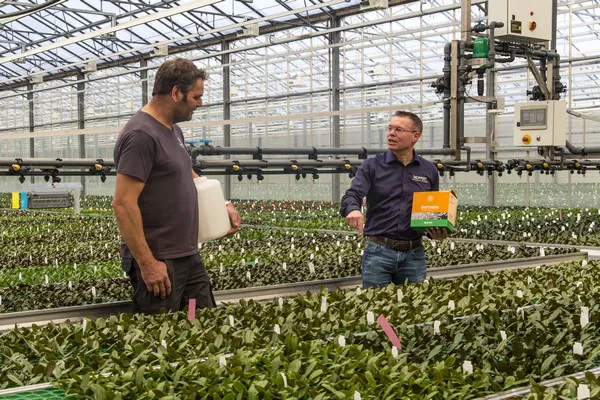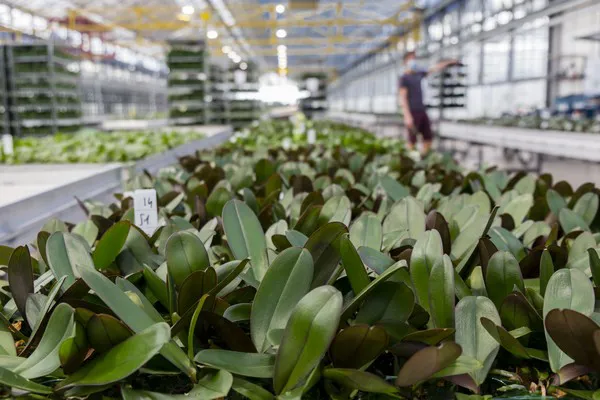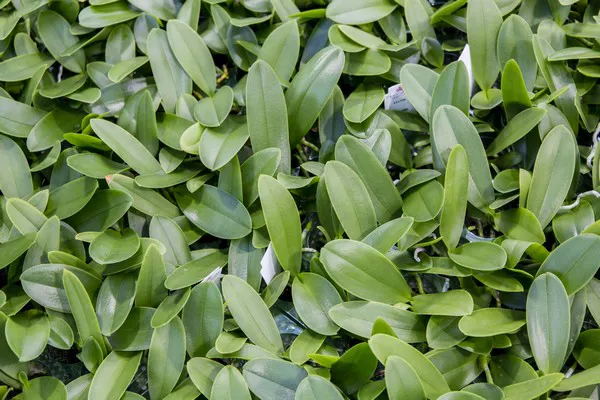Entonem is an excellent product for combating soil-dwelling pests. Floricultura uses it to tackle Sciara and thrips pupae with very good results.
Floricultura is a big name in the international orchid market. The company produces young plants of the Phalaenopsis, Cymbidium, Cambria, and Miltonia varieties. ‘These form the starting material for orchid growers worldwide,’ explains Dennis van der Wel who has ultimate responsibility for all cultivation activities. ‘Nothing can be allowed to go wrong during the propagation phase; our buyers operate a zero-tolerance policy. To make it possible for them to start with a clean plant, we maximize our use of biological plant protection, with a strong emphasis on prevention. The more pests we can keep out of the young plants, the better.’

Rogier Veldhuijs (left) and Wim van der Meer next to a Dosatron. Floricultura leaves nothing to chance when it comes to biological plant protection.
Perfect results
Their maximum biological approach is clear to see: the company uses ten different beneficials for its two sites in Heemskerk, the Netherlands and its third location in Assendelft, the Netherlands. One of them is Entonem, the insect-parasitic nematode Steinernema feltiae. Floricultura uses it to tackle Sciara (fungus gnats) and thrips pupae. ‘It is a good product that we apply to the crops using a Dosatron,’ explains Rogier Veldhuijs, assistant location manager in Assendelft. ‘In the past, the product was not fully compatible with a Dosatron. But since Koppert changed the formulation, it works perfectly.’ It is important to apply it correctly, he says. ‘It’s a careful balancing act; you need to keep the spray solution moving to ensure that the composition is homogeneous and the nematodes are distributed adequately and evenly over the crop.’
Important to avoid slower growth
During the 25 week propagation period, Floricultura applies an Entonem treatment every ten days for the first five weeks. In the interim, the crop is treated with a bacterial preparation. Internal cultivation adviser Jan Mulder explains, ‘It is essential that we do something to combat Sciara gnats every five days. If not, they will break out.’

This is something that Floricultura wants to avoid at all costs, he says. ‘If Sciara gnats are given the chance to develop, they start eating the young roots. This can considerably slow down plant growth. It adds another four weeks to the 25 weeks and you need to take curative measures. All of this costs a great deal of money and is something we want to avoid.’ To combat Sciara gnats and thrips pupae, Floricultura also uses the predatory soil mite Stratiolaelaps scimitus.
Investigating the effect of spraying
Every week, Floricultura examines the action of the nematodes under a microscope. First when they have just come out of the packaging and later after spraying. Dennis van der Wel explains, ‘We dampen the potting soil and then spray the nematodes over the young plants in a fine mist. This is followed by a second fine mist to rinse off nematodes that are on the leaves. A while later, I collect a few drops of drainage water from underneath the treated crop. I examine this under a microscope to check for the presence of nematodes. If I can see them this means that the spraying was successful.’
A high standard
Floricultura’s market is a highly critical one. This is one of the reasons why the company maximizes its use of biological plant protection.
To prevent damage to the young plants, the company has decided to pursue a strict preventive policy. ‘We have set a very high standard,’ say Van de Wel, Veldhuijs, and Mulder. ‘Our dosages and introductions have therefore always been on the high side. It is better to use a little too much than not enough; infestations must always be prevented as much as possible. We certainly don’t skimp on the quantities of beneficials that we use.’

Floricultura’s market is a highly critical one. This is one of the reasons why the company maximizes its use of biological plant protection.
A well-organized approach
Good scouting is a factor that contributes to Floricultura’s success. The company works with ten well-trained scouts who constantly keep a close eye on the various crops.
Floricultura has a close advisory relationship with Koppert’s consultant Wim van der Meer. Each month, he visits one of the three locations to discuss the plant protection methods used throughout the company. He praises Floricultura’s strict and well-organized approach. ‘They leave nothing to chance. And it just goes to show that you can go far if you take this approach.’
 For more information:
For more information:
Koppert Biological Systems
info@koppert.nl
www.koppert.com
